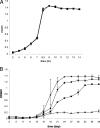Temperature-dependent requirement for catalase in aerobic growth of Listeria monocytogenes F2365
- PMID: 20817809
- PMCID: PMC2976248
- DOI: 10.1128/AEM.01223-10
Temperature-dependent requirement for catalase in aerobic growth of Listeria monocytogenes F2365
Abstract
Listeria monocytogenes is a Gram-positive, psychrotrophic, facultative intracellular food-borne pathogen responsible for severe illness (listeriosis). The bacteria can grow in a wide range of temperatures (1 to 45°C), and low-temperature growth contributes to the food safety hazards associated with contamination of ready-to-eat foods with this pathogen. To assess the impact of oxidative stress responses on the ability of L. monocytogenes to grow at low temperatures and to tolerate repeated freeze-thaw stress (cryotolerance), we generated and characterized a catalase-deficient mutant of L. monocytogenes F2365 harboring a mariner-based transposon insertion in the catalase gene (kat). When grown aerobically on blood-free solid medium, the kat mutant exhibited impaired growth, with the extent of impairment increasing with decreasing temperature, and no growth was detected at 4°C. Aerobic growth in liquid was impaired at 4°C, especially under aeration, but not at higher temperatures (10, 25, or 37°C). Genetic complementation of the mutant with the intact kat restored normal growth, confirming that inactivation of this gene was responsible for the growth impairment. In spite of the expected impact of oxidative stress responses on cryotolerance, cryotolerance of the kat mutant was not affected.
Figures





Similar articles
-
Inactivation of a cold-induced putative rna helicase gene of Listeria monocytogenes is accompanied by failure to grow at low temperatures but does not affect freeze-thaw tolerance.J Food Prot. 2010 Aug;73(8):1474-9. doi: 10.4315/0362-028x-73.8.1474. J Food Prot. 2010. PMID: 20819357
-
Role of growth temperature in freeze-thaw tolerance of Listeria spp.Appl Environ Microbiol. 2009 Aug;75(16):5315-20. doi: 10.1128/AEM.00458-09. Epub 2009 Jun 19. Appl Environ Microbiol. 2009. PMID: 19542335 Free PMC article.
-
Impact of growth temperature and agar versus liquid media on freeze-thaw tolerance of Yersinia enterocolitica.Foodborne Pathog Dis. 2010 Sep;7(9):1125-8. doi: 10.1089/fpd.2009.0526. Foodborne Pathog Dis. 2010. PMID: 20528173
-
Physiology and genetics of Listeria monocytogenes survival and growth at cold temperatures.Crit Rev Food Sci Nutr. 2009 Mar;49(3):237-53. doi: 10.1080/10408390701856272. Crit Rev Food Sci Nutr. 2009. PMID: 19093268 Review.
-
Quantitative risk assessment of Listeria monocytogenes in ready-to-eat foods: the FAO/WHO approach.FEMS Immunol Med Microbiol. 2003 Apr 1;35(3):263-7. doi: 10.1016/S0928-8244(02)00468-6. FEMS Immunol Med Microbiol. 2003. PMID: 12648845 Review.
Cited by
-
The expression of superoxide dismutase (SOD) and a putative ABC transporter permease is inversely correlated during biofilm formation in Listeria monocytogenes 4b G.PLoS One. 2012;7(10):e48467. doi: 10.1371/journal.pone.0048467. Epub 2012 Oct 31. PLoS One. 2012. PMID: 23119031 Free PMC article.
-
Oxidative lesions and post-treatment viability attenuation of listeria monocytogenes triggered by atmospheric non-thermal plasma.J Appl Microbiol. 2022 Oct;133(4):2348-2360. doi: 10.1111/jam.15688. Epub 2022 Aug 3. J Appl Microbiol. 2022. PMID: 35751464 Free PMC article.
-
Transcription factor σB plays an important role in the production of extracellular membrane-derived vesicles in Listeria monocytogenes.PLoS One. 2013 Aug 20;8(8):e73196. doi: 10.1371/journal.pone.0073196. eCollection 2013. PLoS One. 2013. PMID: 23977379 Free PMC article.
-
Impact of c-di-AMP Accumulation, L-cysteine, and Oxygen on Catalase Activity and Oxidative Stress Resistance of Listeria monocytogenes 10403S.Microorganisms. 2025 Jun 16;13(6):1400. doi: 10.3390/microorganisms13061400. Microorganisms. 2025. PMID: 40572288 Free PMC article.
-
Listeria monocytogenes Relies on the Heme-Regulated Transporter hrtAB to Resist Heme Toxicity and Uses Heme as a Signal to Induce Transcription of lmo1634, Encoding Listeria Adhesion Protein.Front Microbiol. 2018 Dec 18;9:3090. doi: 10.3389/fmicb.2018.03090. eCollection 2018. Front Microbiol. 2018. PMID: 30619169 Free PMC article.
References
-
- Azizoglu, R. O., and S. Kathariou. 2010. Inactivation of a cold-induced putative RNA helicase gene of Listeria monocytogenes is accompanied by failure to grow at low temperatures but does not affect freeze-thaw tolerance. J. Food Prot. 73:1474-1479. - PubMed
-
- Bolton, F. J., D. R. A. Wareing, and A. D. Sails. 1997. Comparison of a novel microaerobic system with three other gas-generating systems for the recovery of Campylobacter species from human faecal samples. Eur. J. Clin. Microbiol. Infect. Dis. 16:839-842. - PubMed
Publication types
MeSH terms
Substances
LinkOut - more resources
Full Text Sources

